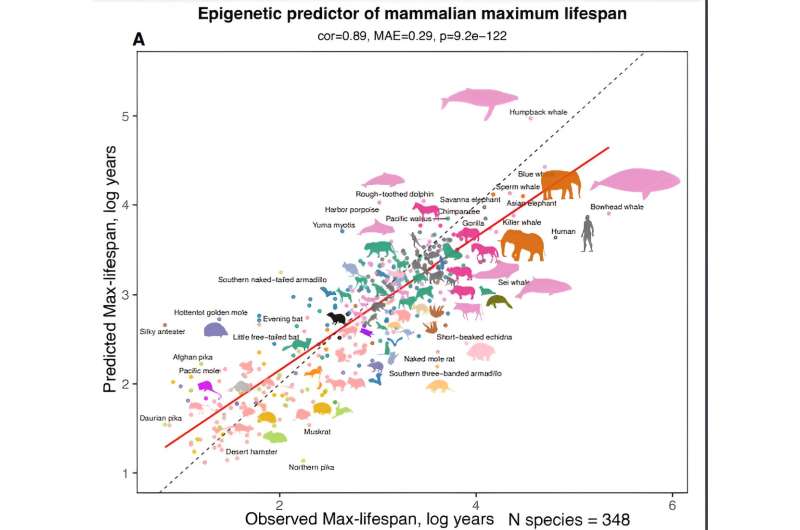June 10, 2024 report
This article has been reviewed according to Science X's editorial process and policies. Editors have highlighted the following attributes while ensuring the content's credibility:
fact-checked
peer-reviewed publication
trusted source
proofread
Deriving mammalian DNA methylation predictors for maximum life span, gestation time and age at sexual maturity

A research team has found that there are epigenetic predictors of species life span and other traits in mammals. In their paper published in the journal Science Advances, the group describes how they analyzed data held in a database created by the Mammalian Methylation Consortium, and what they learned by doing so.
The team includes biostatisticians, biological chemists, and geneticists at the University of California, working along with colleagues from several other institutions in the U.S. and one in the U.K.
Prior research has shown that different mammals have vastly different lifespans—humans live much longer than dogs or cats, for example. But why this is the case has not been explained. In this new effort, the research team focused on epigenetics—the study of changes in organisms that are passed down over generations due to modification of gene expression, rather than gene mutations. Or more specifically, they looked at how epigenetic clocks can predict three life-altering traits: time of gestation, duration of puberty and maximum lifespan.
To study such clocks, they accessed data from the Mammalian Methylation Consortium, focusing specifically on epigenetic modifications in 15,000 tissue samples collected from 348 mammal species. They then developed several algorithms that could accept the data they had collected and use it to make epigenetic estimates based on their three chosen criteria.
In running and honing their algorithms, they found they could use them as lifespan predictors for mammals that had not been included in the database. Testing showed them to be highly accurate.
The researchers then looked to see if there might be environmental factors that influence lifespan, such as diet, and did not find any. They found the same results when testing smoking, race, weight, cognitive function and metabolism. The only factor they found that made a difference was gender—females across mammalian species tended to live longer than males.
The team concludes by suggesting that lifespan for humans, and other mammals, is "strongly associated with an epigenetic signature." One that is unique to each species, and difficult to change.
More information: Caesar Z. Li et al, Epigenetic predictors of species maximum life span and other life-history traits in mammals, Science Advances (2024). DOI: 10.1126/sciadv.adm7273
Journal information: Science Advances
© 2024 Science X Network




















